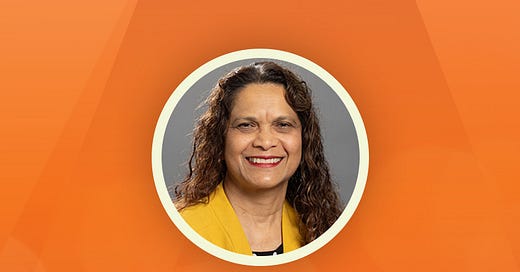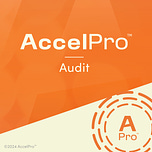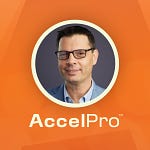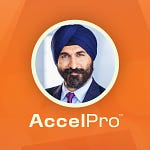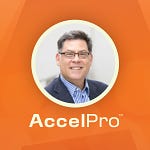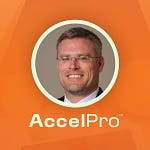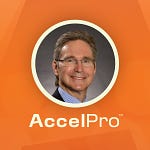Listen on Apple Podcasts, Spotify and YouTube
Welcome to AccelPro Audit, where we provide expert interviews and coaching to accelerate your professional development. Today we’re featuring a conversation with Veena Brown, Associate Professor of Accounting and program director at the University of Wisconsin Milwaukee.
We discuss the need to address unconscious bias in the audit and accounting industries, as well as support and encourage students as they navigate their way towards these careers. Brown, a first-generation immigrant from Trinidad and Tobago and the first of her family to receive a bachelor’s degree, emphasizes that the biggest barrier to entry for those wishing to join the industry is lack of support and training. She posits that revamping the curriculum to include a contribution, additive, transformative, and social action approach to inclusion will allow students to see the industry as more accessible and relevant.
Listen on Apple Podcasts, Spotify and YouTube
Interview References:
Veena Brown’s University of Wisconsin Milwaukee profile.
4:40 | Pelzer, J. R., Booker, D., Pencle, N., & Brown, V. L. (2023). Making The Case For Diversity: Exploring The Use Of Case Studies For Underrepresented Minorities In The Accounting Curriculum. Issues in Accounting Education, 38(3), 39-63. American Accounting Association.
6:45 | Banks, James. (2014). An Introduction to Multicultural Education. Pearson Education, Inc.
11:51 | Sidgman, Juergen and Brown, Veena and Brazel, Joseph. The Multitasking Audit Environment: The Effect of Alternative Modes of Communication on Team Performance. (November 15, 2020).
TRANSCRIPT
I. GAINING THE AUDITOR MINDSET
Alizah Salario, Host: You're currently a professor at the University of Wisconsin, Milwaukee, and you have an extensive body of research particularly focusing on the behavior of auditors and audit quality. What made you interested in this particular area of audit?
Veena Brown: My first love really was in finance, not necessarily accounting per se. Finance is a space that I went to because I love money and handling money and dealing with people's money. But as I advanced in my career in the finance field, I saw that people and employers were looking for accountants, so I went back and did my accounting degree. And to be honest, I wasn't really a lover of the numbers in preparing the financial statements; I fell in love with the backend of it.
As an auditor, we look at the financial statement that's already prepared and we unravel it to understand how the clients prepare these numbers. In other words, do they have support for it? As I learned more about research, it was interesting to me what influenced the auditors to behave in a certain way. As auditors, we are under a lot of pressure. We have deadlines.
AS: Given that context regarding how audits are under a lot of pressure and someone is relying on your integrity and reputation to do good work there's chances that auditors could take shortcuts, or they could have other external pressures influencing the behavior. I’m interested in how that impacts the audit and audit quality overall, and how it impacts your approach in the classroom. In other words, how does your research shape your teaching?
VB: I bring that experience I have as an auditor and my mindset during the time I audited into the classroom as I teach the content. Because the classroom relates very closely to what happens in the real world, which is not always the case for most other subjects. And even though we have many different areas of auditing and different types of clients, the basic premise of an audit relates to any type of entity.
For instance, I was talking to them about unconscious bias. We have biases with these pressures; we may tend to take the easy way out. Or we may ask the client a question and be readily willing to accept the answer that they give rather than taking a step back and saying, “You know what? I need to ask follow-up questions, I need to look into this a little bit more and get additional evidence.” And that's how I bring the two things together.
—
II. DECOLONISING THE ACCOUNTING CURRICULUM
AS: I want to talk about a recent paper that you authored that focused on the decolonization of the accounting curriculum. You mentioned things like unconscious bias and accepting answers at face value. I have a feeling that there's a connection there, but how exactly does one decolonize the curriculum?
VB: That was an interesting study and that was my most recent publication. I'm very proud of that paper. The Webster Dictionary version of decolonization means to free people or an area from colonial status. They're relinquishing control to a people who have been subjugated, out from the dominating influence of a colonizing people’s power.
In the context of this study, first we had to acknowledge the fact that a curriculum, as we know it in the business world, is commonly centered around an ethnocentric point of view. Which means it's focused on European culture or history to the exclusion of other wider points of views.
We're basically saying that the business curriculum, and more specifically an accounting curriculum, needs to be decolonized so that we can validate and look at other perspectives of historically marginalized groups. We want to expand the student and faculty world views of the profession. We want to provide contextualization of accounting issues, making them more relevant and accessible to students by identifying members of these groups and sharing their experiences. Prior studies have shown that decolonization in the curriculum helped foster a sense of belonging of URM individuals.
And by URM, in the study I'm talking about, I’m specifically referring to underrepresented minorities: Black, Latinx, and Native Americans.
AS: In the field of audit, how does putting the perspectives of URM individuals more prominently improve audit quality?
VB: In our study, we looked at how we could change or transform a curriculum. We focus specifically on the accounting curriculum. In that study, we use an approach developed by Banks in 2014. That's a curriculum transformation framework that provides a hierarchical approach to transform a curriculum. And in our study, we focus on the level three and level four of that approach.
In the first level is the contribution approach. That area focuses on heroes, holidays, and discrete cultural elements. For example, in the accounting area, we may highlight the contribution of famous or successful URM individuals in accounting or highlight URM perspectives only on particular holidays. Those are minor tweaks or minor changes, it doesn't really affect great change, but it's a little bit of awareness, it's a step forward.
Then there's the additive approach: content, concepts, themes, perspectives are added into the curriculum without necessarily changing any structure. For example, adding a single case study with a URM topic or only changing the name of a protagonist, for instance, without necessarily weaving in the culture and then the topics within the curriculum or the content of the story.
Then there's a transformative approach. In this case, we want the structure of the curriculum changed to enable students to look at and view concepts, issues, events, and themes from the perspective of diverse and cultural groups. For example, integrating case studies that focus on the lived experiences of URM individuals. Maybe taking an individual who has a small business and showing how that person developed that business and bringing him as a guest speaker into the classroom. You're getting the perspective and lived experiences of these individuals, which help the students relate to that individual and realize that we have URM individuals who can do these things and who have done these things.
And then the last phase of this framework is a social action approach. Here students make decisions on important social issues and take actions to help solve them. That might be assigning case studies that require students to reflect on your issues and potentially identify ways to address larger social issues. As an example, accounting cases in this stage would require an integrative perspective on the issue. That takes a little bit more effort, of course, but these are some real ways we can make changes.
AS: I'm interested in some of the other barriers to entry, particularly in external audits, for young people who might be considering entering the field. Can you dig in there and talk about why we see this lack of diversity persist?
VB: I recently went to an auditing and accounting conference, and we have representatives from the workforce who speak to DEI issues and problems they have in the firm as new employees or even managers. I'm going to step back a little bit to the accounting profession in high school and the academic world before getting into the real world. If we go back to the point where students are looking for an education, URM individuals don't see themselves in accounting. They don't see themselves as having the skill set to be an accountant because they think it's focused on math or knowledge of science.
In reality, it's more about problem solving and trying to understand what has been done, and how do I undo or understand that information, rather than about the math involved. That perception has limited the number of individuals coming in. Then you mentioned cost. Cost is a factor for students who have been historically in a minority group that don't have the resources to pay for college.
Being in this group myself—I was the first person in my family of seven who had a bachelor's degree, and now all the way up to a Ph.D., and I'm the last of the seven kids. But I never saw myself as wanting to be in that space. I want it to be what I'm doing right now, so I pushed against the barriers that exist to make that happen. Not everyone has that persistence or the opportunities that my parents helped me to achieve.
Once they have entered the profession, though, is when they need to be given the training and the resources to help them succeed. I'm not saying give things away, but give them the opportunity. Once they get hired by these firms, the support and the collaboration need to continue. Because, again, they don't have a lot of individuals like themselves in the environment, so they may feel isolated. It's important for these individuals to feel that they belong to this organization. And I think all that will help create this environment of inclusiveness and increase diversity, not just for one group, but for all groups.
AS: I definitely want to circle back to you being the seventh of seven kids, but let me go in order. You co-authored a fascinating study about multitasking, and you found that it was unavoidable in the audit setting as different engagements often have competing demands. And the application for this in a pre-COVID world versus a post-COVID world, where we see far more remote work, is really interesting.
VB: When we did this multitasking study it was a great study because people were really doing well. We say there are studies out there that say, ‘Humans can't really multitask,’ they just do, a bunch of different things at the same time, and they do it all inefficiently. That's what I tell my students. You're not really multitasking, you're just doing a bunch of things and you're not really doing it well.
And our study is finding that. It's multitasking, yes, but you're not being your most efficient and most effective while you're doing these different things because our brain could only really focus on one thing at a time. We are just taking that same capacity and dividing it up into multiple tasks. Your capacity to focus is limited to any one task.
In a pre-COVID environment, we found that the participants were more able to perform, listen, understand, and regurgitate the information when they were in a face-to-face environment. The performance in our test was better when they were communicating face-to-face; they understood and heard and listened to the person next to them. When we measured that in the other two scenarios, chat and discussion board, we found they were less effective, but those two platforms were similar.
Face-to-face was higher, but the other two were similar. We also found that texting, which is kind of like the chat situation, tends to provide a little bit more effectiveness of performance in that space. We think that might be generational because the individuals we are looking at were familiar with chat and texting, so they're familiar with that space. They're able to operate in that environment really well.
Then COVID happened and everybody was asked to transform. Transforming that space to being online, we had some learning curves. Now multitasking is a necessity. It's almost like a requirement. We probably couldn't have done this otherwise because we wouldn't have met the obstacles in meeting in person. In this environment where everyone could hook up to a computer and a microphone and a screen and do this, it's becoming more the norm. We can get more things done from a wide perspective.
The negative side is that the students or the new employees in auditing operate more on an apprenticeship model, learning from others, people who have been there two years and three years. We learn from our partners’ and supervisors’ actions and their knowledge. In this current model, post-pandemic, where some of us are working at home, not everyone is engaged collectively in the same room. We have lost that. It is affecting performance on some level. There's research being done to look at that; we are still finding that face-to-face is the best overall in achieving performance in some areas, but maybe not in all areas.
But there are some benefits to the environment that we live in; in the video conferencing world, we can leverage expertise from others that we probably didn't have with us in the room.
AS: This is happening in industries across the board. Multitasking remote work has become the norm, but what are the specific implications for audit given the very detailed and nuanced nature of the field?
VB: It’s one of the biggest things I was just talking about in terms of hires. We were in a pandemic for about, what, two to three years and these individuals went through the process in higher education behind a screen.
The model of learning was through this apprenticeship model, and we have given that up. They don't have exposure for the new hires who rely on that face-to-face. I want to see what you're doing so I can learn the way to behave and the way to act, and how to deal with clients in the real world. We recently had a partner tell us that they want us to help students be better communicators, not only in writing; they need to be able to speak better and speak in front of a client.
The students who went through COVID are preferring to send an email to the client than asking a question, even though the client might be in the next room. Sometimes, this is not as effective for reading the person, especially in this type of audit environment, where you're relying on the trustworthiness of the client. They don't want to prepare the financial statement, then you want to make sure the financial statement is properly backed up. We're losing that.
—
III. ACCOUNTING: FOR THOSE WHO LOVE TO LEARN
AS: I want to switch gears and talk a little bit about your education and your career path. You have extensive experience in finance. you've held positions at American Express, Nations Bank, which is now Bank of America, the State of Florida Department of Financial Services and more. What prompted you to move from the world of financial services to academia?
VB: I love teaching. I love mentoring. I love telling people what to do, and teaching was always my passion. The other area was learning. Basically, I wanted to get that experience and wanted to bring that in front of the students, because as a student, I felt it necessary that my instructor had some experience in what they were talking about, not regurgitating the textbook. My wide range of experience, even the fact that accounting wasn't my first love, is actually the path of many accountants. Very few say, “I want to be an accountant, I want to be a CPA.” I wanted to be all kinds of things before I ended up here.
What I knew I wanted to do, however, was be a university level professor. I just didn't think it would be necessary in accounting. But now that I teach auditing and I have worked in auditing and I have researched it for many years, I feel like it's all around me and what I do every single day. I'm just living the dream.
AS: That's wonderful. You mentioned that you're the youngest of seven children and you were the first among your siblings to get a bachelor's degree. I'm so curious about your journey and specifically if there are any people that stand out along the way who helped you.
VB: I come from the island of Trinidad and Tobago. I grew up there for the most part. Like I said, I was the last of seven siblings, so I have all these stories of all of us sharing one bedroom and all that good stuff, things I can bring to my students, struggles that you can overcome. But I had fun growing up and that involved all my sisters. We weren't rich. We were poor, but probably better than others in my street. But there was always a sense of, I love education. I love learning.
And I think that's what pushed me every step of the way. My siblings had a path. You have to get married by the time you're 18, especially if you're a girl. And for me, it was always, ‘I want to study.’ By the time we came to this country, I was the only one young enough to be able to do that under my parents’ guidance. I came up and went to university and colleges here, putting myself through school. And because I like learning, I received scholarships to help me pay for my education while working full time. That’s something I can bring to my students in Milwaukee because they are all working people, hardworking individuals, and they want an education.
AS: I'm always fascinated particularly by women who have certain cultural expectations that they don’t follow. My last question is just a short one and it's whether or not you think of audit as a public service.
VB: Definitely. It is a public service. As auditors, we are in a unique position from other public servants. I am not a tax auditor, but a tax auditor would be a type of individual who serves the client that they prepare tax returns for. As an external auditor who audits financial statements of companies, be it public or private, our client is essentially the person who is reviewing those financial statements. That's the individual we are serving. In the case of public companies, it's the public, the investors, the government, it may even be the employees—whoever is using the financial statement to make decisions.
As an auditor, we are not serving the person who's paying us, which is why we have all these rules and ethical standards that we have to live by. We need to be independent of the client. And that's an additional pressure we have as auditors, because we are pressured by the client who says, “I'm paying your salary, so you have to do what I say.”
And we will say, “No, I'm serving the investor,” and I have to be independent in fact and in appearance. I have to follow the guidelines, and my reputation is really what guides me. And that's what I tell my students: the one thing you have is your reputation. That's what external auditors have to depend on. That's what will keep you in line and get you out of trouble.
Listen on Apple Podcasts, Spotify and YouTube.
This AccelPro audio transcript has been edited and organized for clarity. This interview was recorded on January 25, 2024.
AccelPro’s expert interviews and coaching accelerate your professional development. Our mission is to improve your day-to-day job performance and make your career goals achievable.
Send your comments and career questions to questions@joinaccelpro.com. You can also call us at 614-642-2235.
If your colleagues in any sector of the audit field might be interested, please let them know about AccelPro. As our community grows, it grows more useful for its members.


